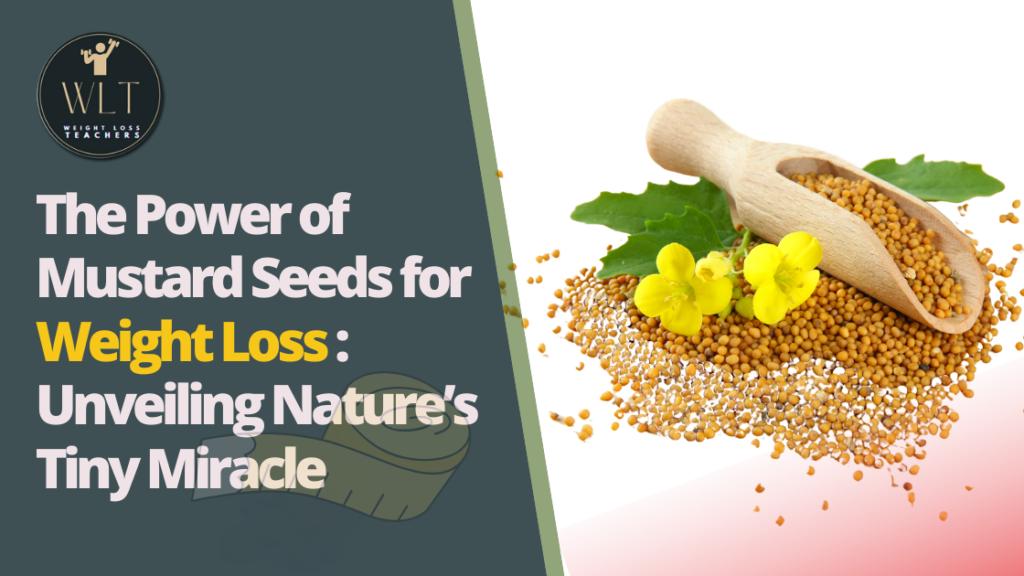
The Power of Mustard Seeds for Weight Loss: Unveiling Nature’s Tiny Miracle

In the quest for effective weight loss methods, nature provides us with a multitude of treasures, one of which is the humble mustard seed. These tiny powerhouses of nutrition have been used for centuries in culinary and medicinal applications. However, their potential as a weight loss aid is often overlooked.
Table of Contents
Mustard Seeds for Weight Loss
This article aims to shed light on the incredible benefits of mustard seeds for weight loss, exploring their nutritional composition, metabolic effects, and practical ways to incorporate them into a healthy diet.
Section 1: Nutritional Composition of Mustard Seeds

Mustard seeds are a rich source of essential nutrients that support overall health and contribute to weight loss efforts. This section highlights the nutritional composition of mustard seeds, emphasizing key components that promote weight loss.
Fiber Content
- Mustard seeds are an excellent source of dietary fiber, with approximately 2.2 grams of fiber per tablespoon (11 grams) of seeds. Fiber is essential for weight loss as it provides bulk, promotes feelings of fullness, and helps regulate bowel movements. The soluble fiber present in mustard seeds forms a gel-like substance in the digestive tract, slowing down the digestion and absorption of carbohydrates. This helps to stabilize blood sugar levels and prevent spikes in insulin, which can contribute to fat storage. Additionally, the insoluble fiber in mustard seeds adds bulk to the stool, aiding in healthy digestion and preventing constipation.
- To incorporate mustard seeds’ fiber content into your diet, you can sprinkle them on top of salads, soups, or yogurt, or use them as a topping for roasted vegetables. You can also grind them into a powder and add them to smoothies or baked goods for an extra fiber boost.
Protein Content
- Mustard seeds are a surprising source of plant-based protein, containing approximately 2.6 grams of protein per tablespoon (11 grams) of seeds. Protein plays a crucial role in weight loss as it promotes satiety, helps preserve muscle mass, and supports the body’s metabolism. Including an adequate amount of protein in your diet can help reduce cravings, prevent overeating, and enhance fat burning.
- Adding mustard seeds to your meals can provide a protein-rich boost. You can sprinkle them on top of stir-fries, incorporate them into homemade energy bars, or mix them into plant-based burger patties. Mustard seed protein is especially beneficial for individuals following vegetarian or vegan diets, as it contributes to meeting their protein requirements.
Healthy Fats
- Contrary to popular belief, not all fats are detrimental to weight loss. Mustard seeds contain healthy fats, predominantly monounsaturated and polyunsaturated fats, which are beneficial for heart health and weight management. These fats can increase feelings of fullness, stabilize blood sugar levels, and promote the utilization of stored body fat as an energy source.
- Mustard oil, derived from mustard seeds, is a particularly healthy fat option. It is rich in monounsaturated fats, similar to olive oil. You can use mustard oil in salad dressings, marinades, or for sautéing vegetables. Remember to use it in moderation due to its high caloric density.
Essential Micronutrients
- Mustard seeds are not only a source of macronutrients but also a powerhouse of essential micronutrients. They contain significant amounts of calcium, magnesium, iron, and vitamin B complex, which are vital for various bodily functions, including metabolism and energy production. These micronutrients support overall well-being, ensuring that your body functions optimally during your weight loss journey.
- Calcium, present in mustard seeds, has been linked to weight loss and the prevention of fat storage. It plays a role in regulating fat metabolism and signaling the body to burn stored fat rather than storing it. Additionally, iron is essential for maintaining energy levels and preventing fatigue, which can often derail weight loss efforts.
- By incorporating mustard seeds into your diet, you can boost your intake of these essential micronutrients. Use them as a topping for yogurt, mix them into smoothies, or sprinkle them over roasted vegetables to take advantage of their nutritional benefits.
Section 2: Metabolic Effects of Mustard Seeds

Mustard seeds exert various metabolic effects that contribute to weight loss. This section delves into the mechanisms behind these effects, backed by scientific evidence.
Thermogenesis
- One of the remarkable metabolic effects of mustard seeds is their ability to stimulate thermogenesis. Thermogenesis is the process by which the body generates heat and increases energy expenditure, resulting in calorie burning and potential weight loss.
- The glucosinolates present in mustard seeds are responsible for this thermogenic effect. When consumed, glucosinolates are converted into compounds called isothiocyanates, which have been shown to enhance thermogenesis in the body. By increasing the production of heat, mustard seeds can boost your metabolism and calorie burn, contributing to weight loss.
- To harness the thermogenic effect of mustard seeds, incorporate them into your meals and snacks regularly. Sprinkle ground mustard seeds onto roasted vegetables, add them to sauces or dressings, or use them as a spice in your cooking. By doing so, you can tap into the thermogenic power of mustard seeds and support your weight loss goals.
Appetite Suppression
- Another valuable metabolic effect of mustard seeds is their ability to suppress appetite. The high fiber content in mustard seeds plays a significant role in promoting feelings of fullness and reducing overall calorie intake.
- Fiber absorbs water in the digestive tract, expanding and forming a gel-like substance. This gel slows down the emptying of the stomach and triggers signals of satiety to the brain, reducing hunger and preventing overeating. By incorporating mustard seeds into your diet, you can increase your fiber intake and improve appetite control.
- In addition to fiber, certain compounds present in mustard seeds, such as sinigrin, contribute to appetite suppression. These compounds influence the production of ghrelin, a hormone that stimulates hunger. By modulating ghrelin levels, mustard seeds can help curb cravings and reduce the desire to consume excess calories.
- To leverage the appetite-suppressing properties of mustard seeds, incorporate them into meals that require a longer digestion time, such as soups, stews, or whole-grain dishes. By doing so, you can feel fuller for longer periods and maintain better control over your food intake.
Regulation of Blood Sugar Levels
- Mustard seeds offer benefits for individuals concerned about blood sugar regulation and insulin sensitivity. Unstable blood sugar levels can lead to increased hunger, cravings, and difficulties in losing weight. Mustard seeds can aid in regulating blood sugar levels and promoting stable energy levels throughout the day.
- The high fiber content in mustard seeds contributes to this effect. Fiber slows down the absorption of glucose, preventing rapid spikes in blood sugar levels. By reducing the rate at which glucose enters the bloodstream, mustard seeds help prevent insulin surges that can lead to fat storage.
- Furthermore, studies have shown that mustard seeds possess anti-diabetic properties, aiding in the management of diabetes and insulin resistance. Compounds present in mustard seeds, such as allyl isothiocyanate, have demonstrated the ability to improve insulin sensitivity, enhancing the body’s response to insulin and promoting better blood sugar control.
- To benefit from the blood sugar-regulating effects of mustard seeds, incorporate them into meals that contain carbohydrates. Adding mustard seed powder or whole seeds to grain-based dishes, legumes, or starchy vegetables can help slow down the release of glucose into the bloodstream, preventing blood sugar spikes and facilitating weight loss.
Section 3: Practical Incorporation of Mustard Seeds in a Weight Loss Diet

Now that we understand the nutritional benefits and metabolic effects of mustard seeds, let’s explore practical ways to incorporate them into a weight loss diet. These strategies will help maximize the potential of mustard seeds and enhance your overall weight loss journey.
Mustard Seed Condiments and Dressings
Mustard seed condiments and dressings are versatile and delicious ways to incorporate mustard seeds into your weight loss diet. Mustard paste, mustard oil, or whole mustard seeds can be used to add flavor and depth to salads, sandwiches, wraps, and vegetable dishes. Additionally, mustard-based sauces and marinades can be used to enhance the taste of lean proteins such as chicken, fish, or tofu.
- To make your own mustard dressing, mix 1 tablespoon of ground mustard seeds with 1 tablespoon of honey, 2 tablespoons of olive oil, and 1 tablespoon of apple cider vinegar. This dressing can be used to dress a green salad, roasted vegetables, or grilled chicken.
Mustard Seed Snacks
- Mustard seeds can also be used to make healthy snacks that support weight loss goals. Roasted mustard seeds make a crunchy and satisfying snack that can be enjoyed on-the-go. To make roasted mustard seeds, toss 1/4 cup of whole mustard seeds with a teaspoon of olive oil and a pinch of salt. Spread the seeds onto a baking sheet and roast at 350°F for 10-12 minutes, stirring occasionally until they are golden brown.
- Mustard seed hummus is another delicious snack option. To make this, blend 1 can of chickpeas with 1 tablespoon of mustard powder, 1 clove of garlic, 2 tablespoons of tahini, and 2 tablespoons of lemon juice until smooth. Serve with vegetable sticks or whole-grain crackers for a satisfying snack.
Mustard Seed Spice Blends
- Mustard seeds can also be used as a flavorful spice blend for meats, vegetables, and stews. To make your own mustard seed spice blend, mix 1 tablespoon of ground mustard seeds with 1 tablespoon of cumin, 1 tablespoon of coriander, 1 tablespoon of smoked paprika, and a pinch of cayenne pepper. Rub this mixture onto chicken, fish, or tofu before grilling or roasting for a tasty and weight loss-friendly meal.
Mustard Seed Soup and Stew
- Finally, mustard seeds can be used to add depth and flavor to soups and stews. Mustard seed soup, also known as sarson ka saag in Indian cuisine, is a flavorful and nutrient-dense dish that can support weight loss goals. To make this dish, sauté 1 onion and 1 clove of garlic in a teaspoon of mustard oil until softened. Add 4 cups of chopped mustard greens and spinach, along with 1 teaspoon of ground mustard seeds, 1 teaspoon of turmeric, and 1/2 teaspoon of cumin. Add 2 cups of vegetable broth and simmer for 15-20 minutes until the greens are tender. Blend the soup until smooth and serve with a dollop of Greek yogurt for a delicious and satisfying meal.
Conclusion
Mustard seeds are a potent and versatile ingredient that can support weight loss efforts through their metabolic effects. Incorporating mustard seeds into your diet can help increase thermogenesis, suppress appetite, and regulate blood sugar levels, ultimately contributing to sustainable weight loss.
To incorporate mustard seeds into your weight loss diet, try adding them to condiments, snacks, spice blends, soups, and stews. Experiment with different recipes and combinations to find the ones that suit your taste preferences and support your weight loss goals.
It is important to note that while mustard seeds can aid in weight loss efforts, they are not a magic bullet. A healthy and balanced diet, regular exercise, and lifestyle habits are essential components of a sustainable weight loss plan. However, by incorporating mustard seeds into your diet, you can add a flavorful and nutritious ingredient that supports your overall health and well-being.
Disclaimer: The information provided in this article is for educational purposes only and should not be considered as a substitute for medical advice. Consult a healthcare professional before implementing any home remedies or making significant changes to your lifestyle.






